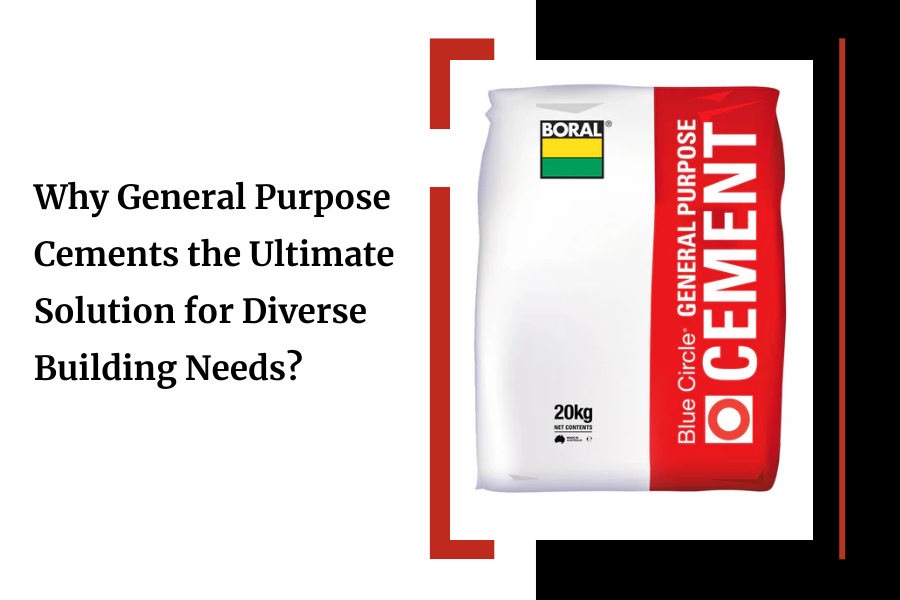At SureLevel International, we understand the vital role cement plays in construction. Cement is the backbone of building materials, essential for creating sturdy and durable structures. Whether you're working on a large-scale commercial project or a small home renovation, choosing the right type of cement is crucial. Here, we’ll explore why General Purpose Cement is an excellent choice for a variety of building needs, focusing on its versatility, performance, and benefits.
The Importance of General Purpose Cement
It is an essential material in the construction industry. It acts as a binder, holding together various construction materials like sand and aggregate to create concrete and mortar. This cement is used extensively in building foundations, walls, pavements, and other structures. Its ability to deliver a reliable and durable result makes it a preferred choice for many construction projects.

What Makes General Purpose Cement a Versatile Solution?
It stands out due to its versatility and adaptability. Here’s why it’s considered the ultimate solution for diverse building needs:
-
Wide Range of Applications: It is suitable for a variety of construction applications. Whether you’re building a new home, renovating an existing structure, or working on a commercial project, this cement provides consistent quality and performance. It’s ideal for foundations, walls, floors, and even decorative elements.
-
Superior Strength and Durability: One of the key advantages of this cement is its strength. It offers excellent compressive strength, which ensures that structures built with it can withstand significant loads and stress. This durability makes it a reliable choice for both residential and commercial projects.
-
Cost-Effectiveness: General-purpose Cement is often more affordable than specialized cement. Its cost-effectiveness makes it a popular choice for budget-conscious projects without compromising on quality. This affordability doesn’t mean a lack of performance; it’s a smart choice for delivering strong and long-lasting results.
- Ease of Use: It is user-friendly, making it a great option for both professional builders and DIY enthusiasts. It mixes well with sand and aggregate to produce a consistent and workable concrete or mortar. This ease of use is particularly beneficial for complex projects or when precision is required.
Different Types of General Purpose Cement
General Purpose Grey Cement
General Purpose Grey Cement is a popular choice due to its affordability and performance. It is composed mainly of limestone, clay, and gypsum and provides excellent workability and strength. It is commonly used in various applications, including concrete, mortar, stucco, and grout.
General-Purpose Off-White Cement
For projects where aesthetics are important, General Purpose Off White Cement is an excellent option. It provides a clean, off-white finish, making it suitable for decorative applications. This type of cement is often used in renderings, grouts, and other concrete.
Water Stop Cement
Water Stop Cement is a specialized type of General Purpose Cement designed to prevent water infiltration. It is used in areas where moisture control is critical, such as basements and water tanks. Its unique formulation helps to seal joints and cracks, providing an effective barrier against water.
Advanced Construction Material: Why Choose General Purpose Cement?
When considering advanced construction materials, it offers several advantages:

How to Use Advance Construction Material Effectively?
To ensure the best results with them, follow these guidelines:
1. Proper Mixing
Following the manufacturer’s mixing ratios for cement is essential. Each type has specific water, sand, and aggregate proportions. Incorrect ratios can weaken the mixture, making it harder to work with. Proper mixing ensures the cement bonds well, creating a strong, durable structure and preventing cracks under pressure.
2. Correct Application
The application of cement is crucial to the project's quality. Each task—whether a foundation, wall, or decorative feature—requires specific thickness, layering, and finishing. Properly applying cement ensures it meets structural needs, enhances performance, and boosts durability, making the construction stronger and longer-lasting.
3. Curing
Once cement is applied, the curing process begins. Curing is the period during which the cement hardens and gains strength. It’s essential to keep the cement moist during this time because moisture helps the chemical reaction, known as hydration, to continue. Proper curing prevents the cement from drying too quickly, which could lead to cracking and weakening. Extreme temperatures, whether too hot or too cold, can affect curing, so it’s important to protect the cement from harsh conditions. A well-cured cement structure is more durable and able to withstand the test of time.
4. Safety Measures
Working with cement requires following safety protocols to prevent health risks like skin irritation, respiratory issues, and eye damage. Always wear gloves, masks, and protective clothing to avoid direct contact. Use a dust mask or respirator to prevent inhaling cement dust, especially in enclosed areas. Safety precautions reduce accidents.
Conclusion
It is a versatile, reliable, and cost-effective solution for a wide range of construction needs. Its superior strength, adaptability, and ease of use make it a top choice for both professional builders and DIY enthusiasts. At SureLevel International, we offer a range of high-quality General Purpose Cements that meet all your building requirements.
For expert advice on choosing the right cement for your project, visit our website or contact our team. We are here to assist you in achieving the best results for your construction endeavors.
Ready to get started? Explore our range of General Purpose Cements today and ensure your next project is built to last. Contact SureLevel International for more information and professional guidance.

